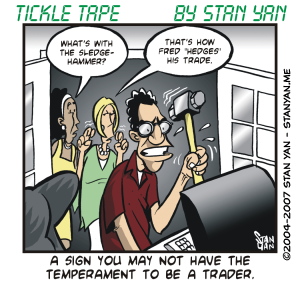The ideal trader personality style consists of a combination of experience, skill, knowledge, discipline, and intuition. The problem with ideals, however, is that they sometimes exist only in our imagination, with few actual candidates who fit the bill. Consider, for example, the traits of discipline and intuition.
A profitable trader must trade the plan, and that means following rules. But most rule-followers live “by the book.” They tend to seek out security and certainty and prefer facts to abstract theories and ideas. Yet there is an intuitive side to trading that is equally important. The market only follows the rules when it does; the rest of the time it goes another way. There is an endless number of inputs and it takes an intuitive mind to piece them all together to come up with a reasonable plan of action.
Perhaps no person has the ideal trader personality. At best, all we can hope for is the right blend of core personality traits. And thus, it is useful to know where you stand in terms of your personality, so you can adapt and change, and bring your trader personality closer to the ideal. Appreciate the characteristics that accentuate your trading while recognizing the characteristics that don’t. Once you identify your personal limitations, you can either develop the personality traits you need or devise trading methods to work around your limitations.
The typologies proposed by philosophers and psychologists are numerous and complicated. But a common and simple way many people classify people is to focus on the extent to which they approach life as an artist or as a scientist. The artsy person thinks in abstract rather than concrete terms. He or she knows how to use intuition to look at the world.
The artist sees reality as a subjective illusion, with each person creating his or her own reality. The scientist, in contrast, believes that there is a single true, objective reality. “If you can’t measure it, it isn’t there” is a credo most scientists live by. “There are cold hard facts out there and it is possible to find them.” Perhaps few artists are steadfastly so abstract, and few scientists believe in a universal reality. But as fuzzy categories, these are useful stereotypes, and ones that are apt to trading.
Which type describes you? Are you more of the scientist or the artist? Are you a blend of these two types? Some traders are 90-10 in favour of science. They are usually interested in developing computerized trading systems that generate automatic buy and sell signals with as little discretion as possible. This type of trader may fall into the trap known as paralysis-by-analysis, an ailment in which far too much time is spent tinkering with the computer program than trading.
One may spend more time backtesting and mining historical data than decisively putting on a trade. It is useful for these traders to work at bringing the blend into more of a balance by injecting more art or human intuition into the trading process. And for these people, it’s useful for them to practice trusting their intuition and taking action rather than being stunned by indecision.
The opposite end of this spectrum is the all-art, no-theory type traders. Their perception of the market is based entirely on abstract feelings and spontaneous emotional response to stimuli. Naturally, this rarely works. Although an intuitive feel for the markets is useful, it’s essential to also look at some “objective” inputs, consider them carefully, and make a sound decision based on the data.
What type of trader are you? Where do you fit in the spectrum between art and science? Take some time to find out and adjust your trading personality accordingly. You’ll find that the right blend will help you trade profitably and consistently.


